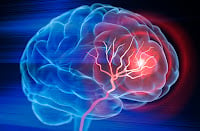Mental Illness, Substance Use Disorder Linked to Stroke

Having a history of mental illness or substance use disorder (SUD) may be linked to an increased risk of stroke, a study in the Journal of Psychiatric Research has found.
Yann Le Strat, M.D., of Louis Mourier Hospital, in Colombes, France, and colleagues examined data from 36,309 participants aged 18 years and older in the National Epidemiologic Survey on Alcohol and Related Conditions-III.
As part of the survey, participants were asked whether during the last 12 months, they had experienced a stroke, and then whether this diagnosis was confirmed by a doctor or other health professionals. The researchers assessed past 12-month mental health and substance use disorders via the National Institute on Alcohol Abuse and Alcoholism’s Alcohol Use Disorder and Associated Disabilities Interview Schedule 5, which uses DSM-5 criteria.
Overall, 297 participants reported having had a stroke in the past 12 months. These participants had 1.59 times the odds of reporting at least one mental disorder or SUD during the past 12 months compared with those who did not have stroke. Those with a recent history of stroke also had more than twice the odds of reporting any mood disorder (such as major depressive disorder) and any anxiety disorder (such as generalized anxiety, panic disorder, social phobia, and agoraphobia). They also had more than twice the odds of reporting opioid use disorder.
Participants who reported having had a stroke in the past 12 months had higher odds of reporting cancer, metabolic conditions, cardiovascular disease, liver disease, digestive disease, sexual disease, lung problems, anemia, traumatic brain injury, and/or nerve disease. Overall, participants who reported having had a stroke in the past 12 months reported having a lower quality of life compared with the control group.
“The debilitating effects of combined mental and neurological disorders make it crucial for health care professionals treating individuals with stroke to screen for a range of physical conditions and mental disorders,” Le Strat and colleagues wrote.
For related information, see The Journal of Neuropsychiatry and Clinical Neurosciences articles “Factors Associated With Anxiety After Hemorrhagic Stroke” and “Poststroke Depression: An Update.”
(Image: iStock/peterschreiber.media)
Don't miss out! To learn about newly posted articles in Psychiatric News, please sign up here.





